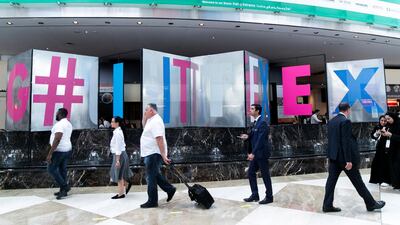The economic impact of the Covid-19 pandemic has given rise to a "new generation" of flexible workers prioritising personal fulfilment over loyalty to an employer, experts said.
From job losses to pay cuts, the global workforce faced some of the toughest challenges brought about by the outbreak.
What it also did was act as a catalyst of change towards the way people work.
According to the ‘Future of Work’ report by Smart Dubai, unveiled as part of Gitex Technology Week, loyalty towards jobs and industries decreased among the majority, while the search for job fulfilment increased among millennials.
“Individuals will no longer be tied to corporate structures, long-term roles or even fixed locations,” the report said.
“Employers are innovating to cater for these possibilities, while simultaneously exploring what it means to have the world’s talent as their recruitment pool.
“Companies need to adapt to a new generation of workers who are not enamoured with the concept of a one job for life.
“Instead, they need to prioritise personal fulfillment and learning over stability.”
Speaking at the unveiling of the report, Younus Al Nasser, assistant director general of Smart Dubai said the pandemic also normalised remote working. And he said it is here to stay.
Since the World Health Organisation declared the coronavirus outbreak a health pandemic nine months ago, this has been one of the biggest shifts in work trends.
According to a study by Global Workplace Analytics, a research firm on employment trends, remote workers will make up as much as 50 per cent of the entire workforce by the end of the year.
_____________________
Gitex 2020 - in pictures
_____________________
“In 2020, almost overnight, remote work became the norm,” the report said.
“As the number of infected individuals was rising around the world, governments and businesses detached from conventions of traditional work routines and embraced new business models.
“Currently being used as a lifeline for many businesses, remote working is expected to be highly adopted, even beyond the pandemic.”
Additionally, the pandemic has triggered a demand among employees to upskill in the workplace as digitisation takes hold.
The report stated that upskilling and reskilling opportunities “needed to be more accessible, fluid and agile” at an organisation.
And if opportunities to climb the ladder are not present in the workplace, employees are likely to look elsewhere for work.
Another bi-product of the pandemic has been the shift in job culture towards the “gig economy”.
This free market system sees companies hire independent workers for short-term commitments. A good example in the past few months has been the uptake in delivery drivers and bicycle couriers in cities like New York in the US and Sydney in Australia.
Experts expect more people to take up this kind of work alongside full time positions in the future to make extra income.
However, the coronavirus crisis has shed light on some of the struggles faced by gig workers as many have lost their income due to city lockdowns around the world.




















